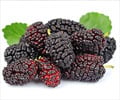Blueberries can not only increase serotonin, but also increase a gene, SKA2, which protects against depression, substance abuse and suicide.

"We need to conduct a clinical trial in people to be certain that this works, but based on our studies in animal models, there is evidence that blueberries may help to mitigate some of the problems associated with PTSD," said Joseph Francis, Ph.D., the Everett D. Besch Professor of Veterinary Medicine at Louisiana State University’s School of Veterinary Medicine and the study’s senior author. "And in the meantime, it seems safe to say that eating blueberries can’t hurt-and may help-in people with PTSD."
PTSD, an anxiety disorder that can develop after someone experiences a traumatic event, affects an estimated 6.8 percent of Americans at some point in their lifetimes.
PTSD diagnoses have risen sharply in recent years and the disorder is particularly common among combat veterans. It is associated with a wide range of psychological, behavioral and social problems such as depression, substance abuse, relationship problems and an increased risk of suicide.
To investigate the biological factors that might contribute to PTSD and its effects, the research team developed a process that induces effects analogous to PTSD in rats, such as exhibiting fear instead of curiosity when presented with an unfamiliar object. They then assessed how eating a diet rich in blueberries affects those factors.
In the new study, the team focused on the role of a gene called SKA2, a gene that other researchers have found is expressed at abnormally low levels in people who have committed suicide.
Advertisement
The researchers then fed some of the PTSD-like rats a diet rich in blueberries-the equivalent of about two cups per day for a person-and found that SKA2 levels increased compared with rats fed a normal diet, suggesting the blueberries had a beneficial effect.
Advertisement
The work builds on a study released last year, in which Francis and Ebenezer found that rats with the PTSD-like experience fed a blueberry-enriched diet showed increased levels of the signaling chemical serotonin in the brain. Since serotonin is associated with feelings of happiness and well-being, that study suggested blueberries might help to alleviate depression in patients with PTSD.
The team is now pursuing research into the links between SKA2 and serotonin levels to find out whether blueberries may simultaneously help relieve feelings of depression and reduce suicidal tendencies through a single biological pathway.
There are a number of medications that increase serotonin levels and are used to treat depression. However, these agents, called selective serotonin reuptake inhibitors, or SSRIs, have shown limited success in treating patients with PTSD, and have even been linked with increased suicidal tendencies in some patients, particularly children and adolescents. Francis said the team’s research aims to fill the treatment gap for PTSD sufferers who do not benefit from existing medications.
"There is an urgent need to identify novel targets for treating PTSD. Based on our findings, blueberries can not only increase serotonin, but also increase SKA2 levels, thereby potentially protecting against untoward behavior," said Francis.
Source-Newswise















